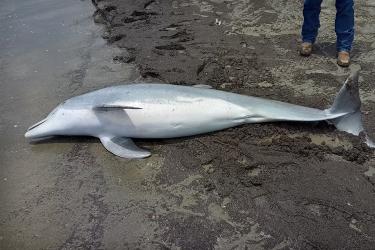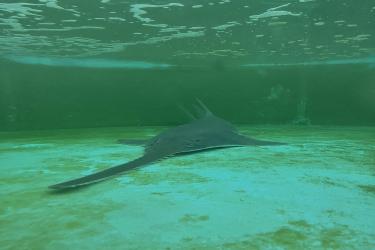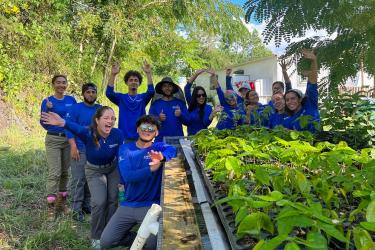Passport to NOAA: Scavenger hunt! – While visiting the NOAA MS Lab’s challenge yourself with a scavenger hunt! Can you get stamps from all the Passport stations and answer questions about NOAA by exploring the exhibits? Give it a try – you never know what you’ll learn!
See Science on a Sphere ® – See Earth in a way you have never seen before! Science On a Sphere ® (SOS) is a global display system that uses computers and video monitors to display planetary data. Imagine a fascinating visual display of all types of data that helps illustrate Earth science.
Under pressure – When you watch the weather do you know what it means when they talk about low or high pressure systems? Watch what happens to a marshmallow as scientists from the National Weather Service change the air pressure around it and learn how that applies to you and everyday objects in our world!
Talking Trash- Marine debris is a problem that plagues coastlines around the world. In the past, it was considered primarily an eyesore. Today, through research, we know how seriously marine debris impacts marine habitats, marine wildlife, human health and safety, navigation and the economy. Come play and talk trash with the Marine Debris Program! Drop trash into the top of the watershed to see where the litter ends up with Litter Plinko, then try your hand at tossing your trash into the correct waste bin with Trash Bean Bag Toss and win a calendar or bookmark!
Paddle the Gulf - Paddle the Gulf aims to network and showcase coastal blueway paddle trails throughout the five Gulf of Mexico States (Texas, Louisiana, Mississippi, Alabama and Florida), thereby enhancing public awareness and promoting stewardship of coastal resources. The project website has a comprehensive map of coastal paddle trails, citizen scientist opportunities such as the Nurdle Patrol and identification of invasive species, and informational/educational materials. The project website will be the primary source for project information and will also serve as a clearinghouse for Gulf-wide paddle trail information. Recyclable trash bags will be given out at Paddle the Gulf events.
Teacher at Sea - The Teacher at Sea (TAS) Program provides a unique opportunity for kindergarten through college-level teachers to sail and work alongside scientists aboard NOAA research ships. The very first TAS in 1990, actually sailed on board a MS Labs research survey, since then the program has allowed over 800 teachers to gain first-hand experience of science and life at sea. Come and learn more about this exciting opportunity and hear first hand from past TAS alumni!
Leveraging Science for Disaster Preparedness, Response, and Recovery - The Disaster Response Center (DRC) and Disaster Preparedness Program (DPP) are core elements of the NOAA National Ocean Services' commitment to improving the nation's capability to prepare for, protect against, respond to, recover from and adapt to natural and man-made hazards.
Water, water, everywhere: A Flood Plain Model - Flood forecasting is important not only for the thousands of inhabitants of flood plain areas but a large portion of the economy is dependent on rivers and flood forecasting. The National Weather Service’s River and Flood Program, and in particular for us here along the Gulf Coast, the Lower Mississippi Resource Forecast Center helps to provide coordinated forecasts for the economically critical lower MS basin. Come and check out their model and watch a flood happen! See how flooding happens and how understanding this can help better predict and monitor all that water!
Your Nose Knows! – A hands-on, nose-on table demonstration of how NOAA Fisheries inspectors check seafood quality. Put your nose to the test to see if you can tell “What’s that smell?!”
Dolphin Guess Who? – Do you think all dolphins look the same? How do scientists tell who is who when they are trying to count them? Stop by and play a game of guess who using the photo identification tools of our scientists! Get a card and try to match your new dolphin friend with our catalog of photos. Can you find yours?
When I grow up – Do you know what a swordfish baby looks like? Some of our biggest fish start out as tiny larval fish, work like our plankton scientists and identify different larval fish and try to match them with who they will grow up to be, how many can you guess correctly?
All caught up – Is it possible to fish for just certain types of fish with a net? Come and see how different sizes in fishing nets can affect what the final catch is by becoming the fisherman! Use our different nets to “fish” and see how your catch is affected and learn about how selectivity in fishing gear can influence how scientists evaluate fish populations.
Whale songs – Have you ever heard a whale sing? Come and check out our listening stations to hear different sounds and songs that scientists have recorded, and learn how marine mammals communicate underwater.
Bringing Underwater Landscapes to Life – Let our 3-D topographic map and sand bring the marine landscape to life! Learn how to shape contours, create mountains, rivers, lakes, and underwater topography with the sweep of your hand. Watch how erosion, elevation changes, and artifacts on the seafloor can impact your landscape. Come play in the sand while you learn!
Magical mini world of plankton –Did you know there’s a whole tiny world living in the ocean? Come and have the chance to look into the microscopic world of plankton and learn about what the tiniest of marine creatures are, how NOAA scientists are able to study these tiniest creatures, and why they are important to our ocean ecosystems. You can even peak at some of the critters that live just off our dock!
Age and growth – Do you know how to tell how old a shark is, or a sea turtle, or a whale? Come and see the different ways scientists figure out just how old some of our marine neighbors are; touch a whale tooth, a skate’s thorn or a fish’s ear bones! Look under a microscope and do some aging of your own and learn how knowing an animal’s age is an important part of understanding how their populations may change over time. Shark Jewelry – After learning about how scientists use a shark’s vertebrae to determine a shark’s age, get your own vertebrae to put on a necklace and take home to teach other people about shark ages! Necklaces are limited to the first 200 people.
Turtle Hurdle – Do your best sea turtle impersonation and “swim” through a trawl net! Since 1987 trawling shrimp boats have been required to have turtle excluder devices (TED’s) which were designed here by the MS Lab’s Harvesting department, to help threatened and endangered sea turtles. The turtle hurdle allows you to experience how TED’s work up close and personal, you’re the sea turtle moving through the net and escaping through the TED while still allowing the net to catch shrimp.
Sea Turtle Fate Game – Imagine you are a baby sea turtle just hatching from your egg. What are the odds you will survive to become an adult and come back to this beach to lay eggs? It takes sea turtles 20-30 years to mature and reproduce. Will you be one of the lucky hatchlings to survive or will you be eaten by a crab or die after eating a plastic bag you thought was a jellyfish? Come and open up your egg to find out your fate.
Gear Monitoring Team’s (GMT) boat – The GMT’s goal is to provide outreach and training to commercial fishers and marine law enforcement in the use and inspection of federally required fishing gear. Knowledge of the different types of federally required fishing gear helps to reduce the capture of protected species like sea turtles. Come and talk to some of the team about their work and get up close to one of their boats!
Keeping warm, marine mammal style! – The water in the Gulf of Mexico can feel pretty warm but do you know how quickly you can lose body heat and get cold even in seemingly warm water? Learn some of the adaptations marine mammals have to stay warm. Feel how blubber can help keep you warm even in icy water and hear about how blubber made whale’s valuable targets for hunters. Learn how laws like the Marine Mammal Protection Act and Endangered Species Act now protect our whales and dolphins.
Remotely Operated Vehicle (ROV)-Shipwrecks, giant coral gardens, sharks, sea spiders, and underwater volcanoes; marine scientists have seen them all. Remotely operated vehicles (ROVs) are robots driven by pilots on a ship that can go to the deepest parts of the ocean. NOAA's Office of Ocean Exploration oversees research vessels around the world that use ROVs to collect high resolution video and images, environmental, and sonar data of ocean ecosystems that are broadcast live to you anywhere! They also use a robotic arm to grab organisms and geological samples, store them inside boxes attached to the ROV, and bring them to our shipboard lab for analysis. NOAA's National Centers for Environmental Information and Mississippi State University manage and distribute data collected on these ships. Come drive miniature ROVs, and ask us all your ocean exploration questions.
How Deep is the Ocean? - Have you ever wondered how deep the ocean is? What about how you would find a boat if it had sank? Come meet NOAA hydrographers who use sound waves to map the ocean floor! Get to see a few autonomous unmanned vehicles that help collect valuable data. Explore the hands on learning tool to map various seabed conditions.
How do you measure up? –Marine creatures come in all sizes, how do humans compare to some of our marine neighbors? Come and see how your height and/or weight compare to some of the big and small guys and gals of the oceans!
Fish with lasers! – How do you measure fish in the water that you can’t reach? Using laser tools you get to be the scientist and estimate the size of sharks and other fish species. You can learn firsthand how scientists on both the shark team and the reef fish team use these tools when they can’t physically reach the animals or even just watch them on video!
Gyotaku – A traditional Japanese method of fish printing. Come and learn how fishermen used this method as early as the 1800’s to record their catch species and sizes while making your own work of art!
Spill your guts – How do scientists know what sharks like to eat? You’ll get the chance to dissect a simulated “shark stomach”, search through its contents and identify different prey items. Learn about marine food webs and why it is important for scientists to know what different animals like sharks are eating and how that can help us better manage fisheries.
Shark dissection –Ever wondered what a shark looks like up close? What about inside? Come by our scheduled dissections and learn about what makes a shark a shark, learn about their different senses, internal anatomy and how years of evolution have made sharks such successful fish!
One fish, two fish, red fish, blue fish– There are over 1,500 species of just fish in the Gulf of Mexico, come and check out some of the species we encounter ranging from eels to shrimp to sharks! After checking out all kinds of marine critters, try your hand at being the taxonomist! While some species are vastly different with extremely different body types, some species look very similar so how do scientists tell them apart? Learn a few techniques including identifying organisms using dichotomous keys and examine some of the more difficult to see characteristics under microscopes.
Skin teeth – Sharks don’t just have all those teeth in their mouths, they even have teeth covering their skin! Come and learn about dermal denticles or “skin teeth” the tiny scales that cover shark skin and that help make them so hydrodynamic. Dermal denticles are also used by scientists as a distinctive trait that can help with species identification. Check out some different species skin under microscopes and see if you can tell the difference!
Photo ID required for adults. No bags, backpacks or ice chests allowed, with the exception of small purses and tote bags. Personal belongings subject to inspection.


